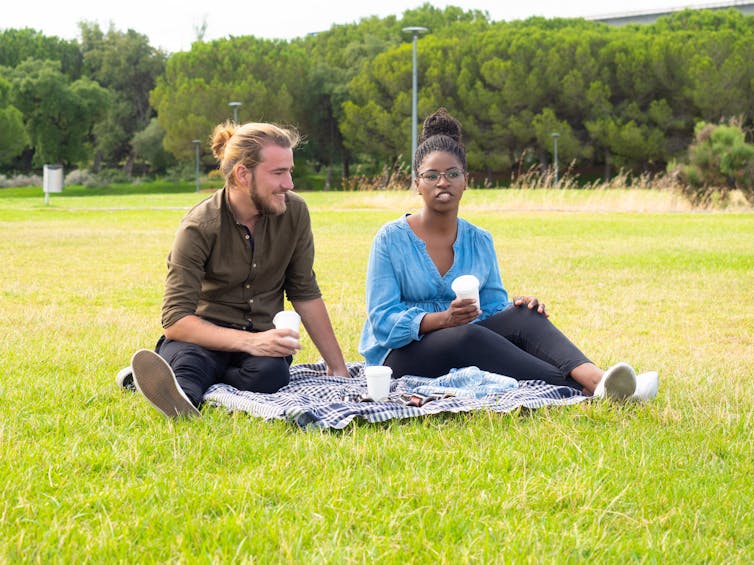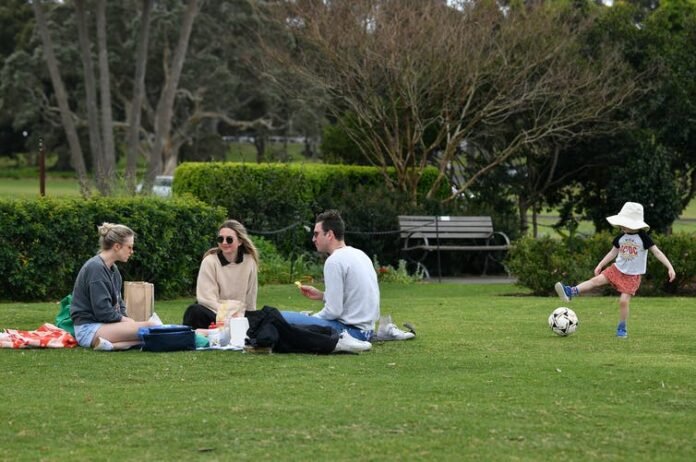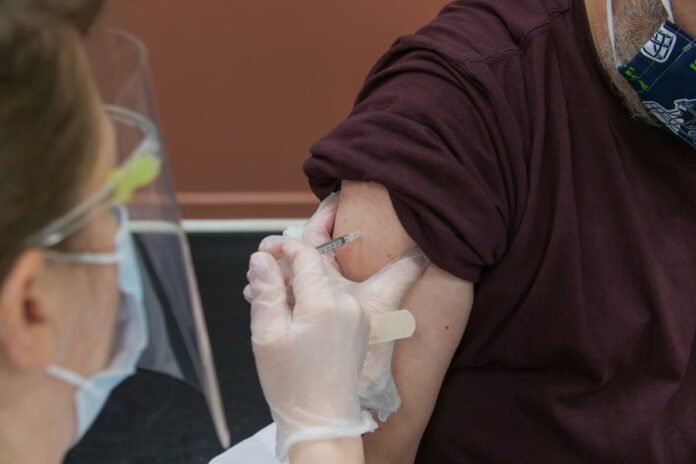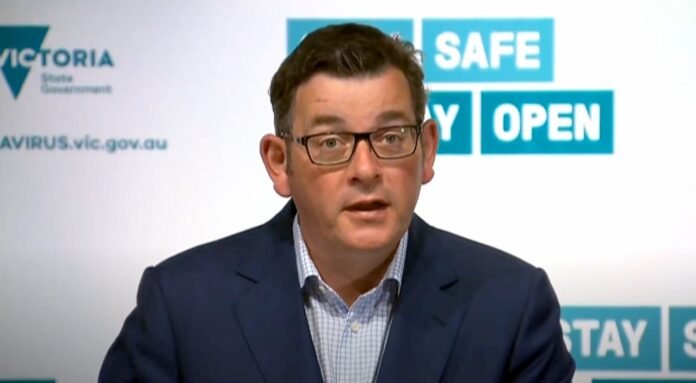By Liam Petterson, The Conversation and Sunanda Creagh, The Conversation
The Victorian government’s roadmap out of pandemic lockdowns includes new provisions for single people living alone and single parents: the “single social bubble” system, which comes into effect on September 14.
Under the new system, if you’re a single person living alone or a single parent with children under 18, you can nominate one other person to be a part of your bubble.
The nominated person can visit your home and you can visit theirs — but only under certain circumstances. Both the single person and the nominated person must wear masks during the visit.
The system will replace the old rule, under which people could leave the house to visit an intimate or romantic partner but not a friend.
We collected answers to some common questions and asked three experts — an epidemiologist, an academic who researches sharehouses, and a philosophy researcher who examines how governments make rules around different types of relationships — to reflect on the new rules.
How long will I have to wear a mask?
Potentially for a good while yet.
Victoria’s Department of Health and Human Services told The Conversation:
Masks will remain a tool in our fight against coronavirus for the foreseeable future. We have seen that there is more and more evidence to support the use of masks in slowing the spread of coronavirus. They are relatively inexpensive, accessible, and not too much of an imposition.
We expect that they will continue to be a part of our daily lives for some time to come.
FAQs for the roadmap to recovery in Victoria can be found on the Vic gov website here.
I’m single but live in a sharehouse or with family. Can I form a single social bubble with my friend?
No. The government factsheet says:
You can only nominate a person to be a part of your ‘single social bubble’ if you live alone, or are a single parent.
If you’re single and live alone, does the person you nominate also have to live alone?
No. Your nominated person can live in a sharehouse or with family. The factsheet says “you are also able to visit them in their home, but only when they are alone.”
So their housemates or family must be out of the house when you (the single person) wants to visit.
I live alone but am not single. Can I nominate a social bubble person to visit – my best friend or my sister, for example?
You’re faced with a tough choice. According to the Victorian government’s FAQ sheet:
people must choose whether they wish to see their intimate partner or form a ‘single social bubble’ with another nominated person.
If you designate someone to be in your bubble, is there some formal procedure? Do you have to register the person or get a permit?
No. If you’re a single person living alone or a single parent, your “nominated person” doesn’t need a permit – the Victorian government says it’s relying on people to “do the right thing”.
Read more: Stage 4 restrictions in Melbourne metro extended to 28 September
The epidemiologist’s view: analysis from Mary-Louise McLaws
I am glad the rule on masks is remaining in place for a while yet. It’s a cost effective way to reduce transmission.
I am pleased the government has responded to calls from the community for compassion. I have argued before in favour of the bubble concept.
Yes, there are a lot of rules about how the single social bubble system will work in practice and some single people will miss out but I can understand why the authorities have done that.
On the rule that a single person can only visit their nominated person’s home if all other adult household members are out, I understand the logic and I think it’s reasonable and likely based on reducing the risk of spread to the household.
Yes, it might be tricky but you will be allowed to sit outside for two hours with one other person, so you and your bestie could be in the park.
Nothing is going to be perfect. Everything will have some logistical challenges but the fact authorities are willing to insert a compassionate component into this roadmap at the first step is commendable. For the sake of those who need support, we need to work around it.
I understand why they have asked people to wear masks when a single person and a nominated person get together in a shared home. There’s still a risk of transmission to others living in the shared accommodation even when they aren’t at home during the visit because the visitor can exhale virus several days before they start to show symptoms. Exhaled virus particles can contaminate surfaces or remain in the air when air flow at home is not high.
I hope people do the right thing. People are desperate to see the person they love or the person that makes them happy to help them get through this pandemic.
I am so delighted authorities are understanding they need to keep people safe and safety includes compassion. This is a step forward. Yes, some people will miss out and yes there are issues around the rules that need to be made safe. But Australia hasn’t had a pandemic quite like this before.

The sharehouse researcher’s view: analysis from Katrina Raynor
My research involved surveying more than a thousand people who have lived in a share house in Victoria at any time in 2020. We found many of them are already under intense pressure.
I think the single social bubbles concept in the new roadmap is an excellent step, but will be experienced differently by people who live in sharehouses.
Throughout the pandemic, I think there has been a presumption towards nuclear families or couples in the way policies have been written.
Particularly in relation to the idea of single social bubbles idea, the idea that a single person living alone can only visit their nominated person if the nominated person is alone in their house — this could be incredibly tricky in practice. And it differs from how intimate partners are treated in the rules.
These rules could present an extra area of conflict for sharehouses, many of which are already in conflict. One person we interviewed described COVID-19 as being like Married at First Sight for housemates, and I think that is very true.
Read more: Victoria now has a good roadmap out of COVID-19 restrictions. New South Wales should emulate it
Rules that stipulate only one person per household can shop are also confusing for sharehouses — housemates tend to shop for their own needs rather than the “household’s”. I suspect there are many who are not or can not follow that particular rule.
While I understand why members of share households won’t be able to take advantage of the single social bubble from a public health perspective, I think many will continue to feel lonely.
We may presume these single people have a fulfilling relationship with their housemates and that’s not always the case.
The philosopher’s view: analysis from Stephanie Collins
I think the single social bubble concept is an improvement on the rules we had before, where people could only visit their intimate partners. That clearly was an instance of society privileging one type of relationship over another, which is a question I look at in my research.
I am not too worried about “coupled up” people who live with an intimate partner and can’t take advantage of the social bubble.
But I am a bit worried about people who are single and living in a sharehouse not being able to form a single social bubble.
People don’t always know their housemates particularly well and might not turn to their housemates for the kind of intimate psychological connections we know are so important for human flourishing.
But we have to acknowledge the law is a blunt instrument. It’s difficult for the government to say “if you are not friends with your housemates then you can visit a nominated person”.
I do think the government is in a difficult position. What they have come up with is not a terrible compromise but it certainly won’t solve every social connection problem.
In general, I am very much in favour of the single social bubble. I think the previous rule really unjustly favoured people in intimate relationships over other kinds of relationships.
I hope this rule sticks around if Victoria or other states need to lockdown again in future. This concept could be integrated and improved in an ongoing way and I hope it’s not a reactionary decision.
Liam Petterson, Assistant Editor, Health + Medicine, The Conversation and Sunanda Creagh, Head of Digital Storytelling, The Conversation
This article is republished from The Conversation under a Creative Commons license. Read the original article.





